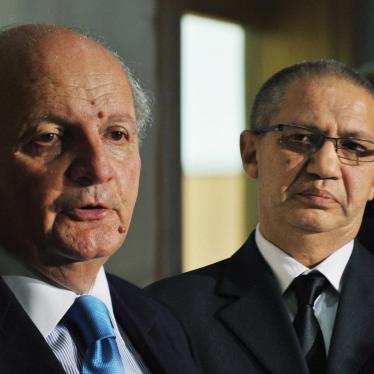Human Rights Watch called on the government of Turkey to allow the lawyers for Abdullah Ocalan, leader of the Kurdish Workers Party (PKK), to carry out their duties without obstruction.
Even people accused of the most heinous crimes, as Abdullah Ocalan is, have the right to a proper defense," said Holly Cartner, executive director of the Europe and Central Asia division at Human Rights Watch. "Turkish law and international law both recognize this right. But it's time for the Turkish government to turn the principle into action." Cartner called on the Turkish government to make a public and unambiguous statement underlining the wholly legitimate role of defense counsel in the forthcoming proceedings.
Human Rights Watch is an international monitoring organization based in New York.
Since he was brought to Turkey on February 15, 1999, Ocalan's lawyers have not been permitted to bring even a paper and pencil to the few, brief interviews with their client that they have been allowed. Those interviews have been held within the hearing of masked security officials. The prosecution presented copies of the indictment to the press before giving it to defense lawyers.
While attempting to conduct their duties, defense lawyers have been mobbed and physically attacked on several occasions, in some cases with the participation of the police. On May 25, Ocalan's main defense lawyer, Ahmet Zeki Okcuoglu, announced that he would not attend the trial due to limitations on the defense. He also urged all 105 attorneys not to attend the trial.
In November 1998, when Abdullah Ocalan first appeared in Italy, Human Rights Watch pressed Italian authorities to prosecute him for crimes against humanity committed by the PKK. At that time Human Rights Watch urged that he not be returned to Turkey, because of the substantial risk that he might be tortured and subjected to the death penalty.
Abdullah Ocalan left Italy and was apprehended and transferred from Kenya to Turkey on February 15. He is currently awaiting trial at the prison island of Imrali near Istanbul. The European Committee for the Prevention of Torture visited Abdullah Ocalan in early March and, though critical of the conditions of isolation imposed on the prisoner, reported that he was not at risk of physical ill-treatment.
Human Rights Watch called on the Turkish government to transfer Ocalan out of isolation. The practice of incommunicado detention, condemned by United Nations bodies and by the European Committee for the Prevention of Torture, persists in Turkey for those detained for offenses under state security court jurisdiction.
Ocalan will be tried before one of Turkey's state security courts, an institution that Human Rights Watch has vigorously opposed. State security courts frequently impose prison sentences for freedom of expression "offenses." The highly respected journalist Oral Calislar was sentenced on May 19 to thirteen months of imprisonment for an interview he conducted with Abdullah Ocalan in 1993. Background information on state security courts is available here.
On June 3, Akin Birdal, president of the Turkish Human Rights Association, will go to prison for a speech in which his crime was to refer to Turkey's Kurdish minority. Background information on Turkey's Kurdish minority is also available here.
Turkey has not carried out a death sentence since 1984, although state security courts have meted out many of them. Human Rights Watch is concerned that Turkey will not sustain its moratorium on the death penalty if there is a conviction in the Ocalan trial. The Turkish parliament, which has the final decision on executions, would be under intense pressure from the military, as well as public passion and anger at the abuses committed in the fifteen years since the conflict with the PKK began. Human Rights Watch opposes the death penalty in general and thus would oppose it in the Ocalan case.








